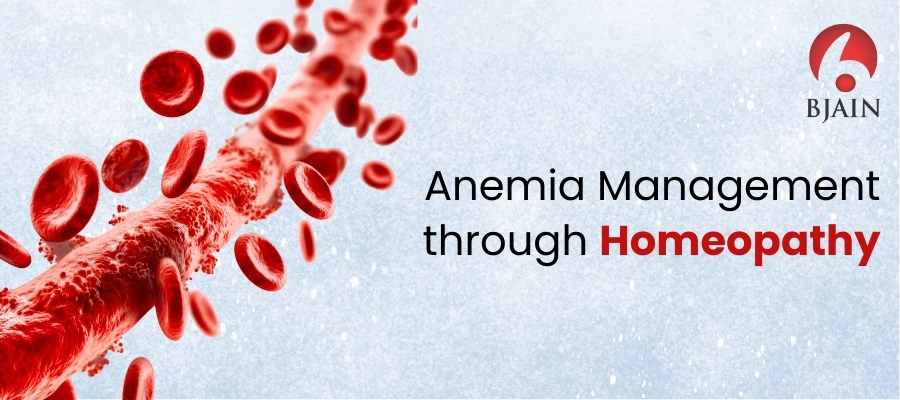Anemia is a blood condition that occurs when there are insufficient red blood cells or the red blood cells do not function properly. Some kinds of anemia can be passed on, while others can be acquired or developed over one’s lifetime.
Anemia can influence your life in a variety of ways. Some cases of this illness have modest symptoms that improve with therapy. Other varieties, such as inherited ones, are more problematic and create long-term medical problems. Serious anemia can be fatal. This illness may potentially be an indication of a more serious ailment, such as cancer.
What are the different Types of Anemia?
There are about 400 forms of anemia, each with a unique cause that can vary from low iron levels, bleeding, or degenerated red blood cells to problems with red blood cell formation. Some of the most prevalent types of anemia are hereditary, linked to malnutrition, or result from aberrant blood cell activity.
Inherited Anemia
A change in a gene may cause you to pass down anemia. Commonly inherited anemias are:
Sickle cell anemia: This type of illness affects the structure of red blood cells, preventing circulation.
Fanconi anemia: This uncommon genetic illness affects several sections of the body, particularly the bone marrow’s capacity to produce normal red blood cells.
Diamond Blackfan anemia: This condition significantly impairs the bone marrow’s capacity to produce sufficient red blood cells.
Thalassemia: This disorder occurs when the body fails to create sufficient hemoglobin, a protein required to carry oxygen all through the body.
Nutritional Anemia
Nutritional anemia develops when your diet lacks enough amounts of key vitamins and minerals. Common dietary anemias are:
Iron deficiency anemia occurs when there is a lack of iron for hemoglobin formation, which is commonly caused by a poor diet or bleeding.
Vitamin B12 deficiency anemia: This is triggered by insufficient B12 consumption or intake, resulting in a decreased red blood cell number and neurological signs.
Megaloblastic anemia is caused by a lack of vitamins B12 and B9 (folate), resulting in the formation of massive red blood cells.
Pernicious anemia: This kind of anemia causes impaired metabolism of ingested vitamin B12, leading to a deficit and an occurrence of megaloblastic anemia.
Anemias resulting from defective red blood cells
This form of anemia is triggered by the body’s failure to create viable red blood cells in sufficient numbers to maintain basic functioning. These disorders are mostly independent of genetics or diet. These conditions might include:
Aplastic anemia can be caused by a stem-cell deficit in bone marrow, resulting in inadequate red blood cell formation.
Autoimmune hemolytic anemia develops when the immune system destroys red blood cells.
Hemolytic anemia is characterized by a failure to maintain enough blood cell synthesis due to the fast disintegration of red blood cells.
Macrocytic anemia develops when the bone marrow creates abnormally big red blood cells.
Microcytic anemia occurs when the red blood cells are tiny than normal.
Normocytic anemia is caused by decreased numbers of red blood cells and hemoglobin values that are lower than normal.
Sideroblastic anemia: This disorder results in aberrant red blood cells and a high level of iron in the body.
What are the risk factors for Anemia?
These variables can raise the risk of anemia.
- A diet low in specific vitamins and minerals. Anemia is more likely if you don’t consume enough iron, vitamin B-12, and folate.
- Small intestinal problems. Having a disease that impacts how your small intestine absorbs nutrition raises the probability of anemia. Examples include Crohn’s condition and celiac disorder.
- Menstrual phases. Generally, having heavy periods increases the risk of anemia. Having periods results in a decrease in hemoglobin.
- Pregnancy. Pregnant women who do not take a multivitamin containing folic acid, as well as iron, are in greater danger of anemia.
- Family history. Having someone in your family with hereditary anemia, which is handed down through generations, might raise the chance of developing inherited anemias like sickle cell anemia.
- Other considerations. Previous experience of certain illnesses, blood illnesses, or autoimmune problems raises the chance of anemia. Consuming excessive amounts of alcohol, being exposed to hazardous chemicals, and taking certain medications can all affect red blood cell production and cause anemia.
- Age. People above the age of 65 have a higher risk of anemia.
What are the symptoms of Anemia?
The symptoms of anemia vary according to the origin and severity of the condition. Anemia might be so subtle that no symptoms appear at first. However, symptoms frequently appear and worsen as anemia progresses.
If another condition causes the anemia, the disease’s symptoms may hide the anemia. Then, screening for another ailment may reveal the anemia. Certain kinds of anemia have indicators that identify the etiology.
Typical signs of anemia consist of:
- Fatigue.
- Weakness.
- Shortness of breath.
- Pale or yellowish skin may be more visible on light skin than on darker skin.
- An unsteady heartbeat.
- Dizziness or feeling lightheaded.
- Chest discomfort.
- Cold fingers and toes.
- Headaches.
How can you manage your anemia at home with diet?
If anemia is caused by dietary inadequacies, increasing your intake of foods high in iron may be beneficial.
Iron-rich foods include the following:
- Iron-fortified foods include cereal and bread,
- Leafy green vegetables including kale, spinach, watercress, pulses, and beans.
- Brown rice,
- White or red meat.
- Nuts and seeds
- Fish,
- Tofu, and eggs
- Dried fruits
What are the Homeopathic Medicines for Anemia?
- Ferrum phosphoricum is the most often used homeopathic medication for managing anemia. It helps to increase hemoglobin levels, reduce skin paleness, manage hematemesis, epistaxis, and blood losses, and helps improve overall health. It helps lower the chance of iron deficiency when pregnant and maintains hemoglobin levels throughout the pregnancy.
- Ferrum metallicum is also effective for managing anemia. It is useful in circumstances such as hemorrhage, vital fluid loss, weakness, menorrhagia, weariness, and yellowing of the skin, mucous membranes, and appearance.
- Cinchona officinalis: This medicine helps when there are symptoms of a lack of vital fluids, excessive bleeding during menstruation, alteration in the volume and quality of blood, weakness, and confusion.
- Calcarea phosphorica: This medicine is beneficial for anemic conditions caused by acute or chronic wasting diseases. Patients may exhibit weakness, loss of attention, weariness, and paleness.
- Natrum muriaticum: This medicine is used when there is extreme debility, fragility, fatigue, throbbing headache, muscular weakness, stiffness, and lack of appetite.
- Phosphorus: This medicine is used when symptoms include rapid prostration, sweating, polycythemia, blood extravasation, hemorrhage, ataxia, and adynamia.
- Pulsatilla nigricans: This medication is used to treat menstruation issues, menorrhagia, fatigue, and headaches caused by excessive work. Anemic individuals suffer from gastrointestinal derangements.
- Omeo Anaemia Medicated Syrup is a blood booster that relieves symptoms of anemia, including weakness, exhaustion, and palpitations.
It comprises outstanding homeopathic treatments, such as:
- Ferrum lacticum is a great management for anemia caused by dietary deficits. It helps boost your vitality and mental sharpness.
- Ammonium aceticum: This substance is made from ammonium acetate and causes a heavy feeling in the head as well as a scraping feeling in the throat.
- Natrum phosphoricum is used to manage jaundice, difficulty swallowing, sour vomiting, and pale thin, watery menstruation.
- Kali phosphoricum: Prostration, fragility, and fatigue are its symptoms. Vertigo, bad breath, paleness, and delayed menstruation.
- Acidum citricum: Useful for weariness and exhaustion. Irregular menstruation with excessive blood and discomfort.
- Acidum phosphoricum causes debility, nervous weariness, and loss of essential fluids. Gum bleeding and a light earth-toned complexion. Weakness, chest pain, and diarrhea.
- Glycerinum is a good therapy for deficiency-related disorders and increases nutrition. Menstruation is both profuse and long-lasting, accompanied by intense fatigue.
- Omeo Anaemia Tablets include four tissue salts that effectively treat anemia and associated symptoms. As a result, it serves as a blood enhancer, assisting with indications such as fragility, palpitation, pallor, drowsiness, and so on.
- Ferrum phosphoricum: Suitable for anxious, sensitive, and anemic individuals with fake and rapid flushing. Extreme prostration with a slow pulse and anxiousness.
- Kali phosphoricum: Prostration, deficiency, and fatigue are its symptoms. Vertigo, bad breath, paleness, and delayed menstruation.
- Calcarea phosphorica: Suitable for anemic people who are irritable, flabby, and have bad digestion. Feeling numb and crawling are typical feelings.
- Calcarea fluorica: Cracked tongue, starvation, and diarrhea.
BJain Pharmaceuticals Pvt Ltd offers quality and genuine medicines for anemia management and helps boost the levels of hemoglobin and total iron. It can enhance your vitality, proper absorption, and assimilation of the nutrition. It can help correct the faulty absorption and help manage the underlying disorder. BJain’s Omeo Anaemia tablets & Syrup is a perfect combo for your health needs. Have a balanced and healthy anemia-free body with Omeo.

Dr Kiran Swami
Dr. Kiran Swami, BHMS, MD (Hom.), a Research Officer at BJain Pharmaceuticals Pvt. Ltd., holds degrees from Nehru Homeopathic Medical College, Delhi, and Dr. Sarvepalli Radhakrishnan Rajasthan Ayurved University, Jodhpur. With expertise in homeopathy and a passion for research, she drives innovation in holistic healthcare solutions.


